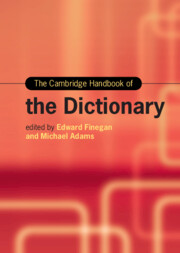Book contents
- The Cambridge Handbook of the Dictionary
- Cambridge Handbooks in Language and Linguistics
- The Cambridge Handbook of the Dictionary
- Copyright page
- Contents
- Figures
- Tables
- Contributors
- Acknowledgments
- Introduction
- Part I Types of Dictionaries
- Part II Dictionaries as Books
- Chapter 9 Dictionary Typography
- Chapter 10 Illustrations in Dictionaries
- Chapter 11 Page and Book Design in Dictionaries
- Chapter 12 Dictionaries in Book History
- Chapter 13 Dictionaries as Material Objects
- Part III Dictionaries and Ideology
- Part IV Dictionaries and Domains of Use
- Part V The Business of Dictionaries
- Part VI The Future of Dictionaries
- References: Dictionaries
- References: Secondary Works
- Index
Chapter 13 - Dictionaries as Material Objects
from Part II - Dictionaries as Books
Published online by Cambridge University Press: 19 October 2024
- The Cambridge Handbook of the Dictionary
- Cambridge Handbooks in Language and Linguistics
- The Cambridge Handbook of the Dictionary
- Copyright page
- Contents
- Figures
- Tables
- Contributors
- Acknowledgments
- Introduction
- Part I Types of Dictionaries
- Part II Dictionaries as Books
- Chapter 9 Dictionary Typography
- Chapter 10 Illustrations in Dictionaries
- Chapter 11 Page and Book Design in Dictionaries
- Chapter 12 Dictionaries in Book History
- Chapter 13 Dictionaries as Material Objects
- Part III Dictionaries and Ideology
- Part IV Dictionaries and Domains of Use
- Part V The Business of Dictionaries
- Part VI The Future of Dictionaries
- References: Dictionaries
- References: Secondary Works
- Index
Summary
What is the stuff of dictionaries? And why does thinking about that stuff matter? These are the paramount questions of this chapter. The physical print dictionary is a specter that looms large in media and the popular imagination, but dictionaries aren’t just or only big books. Accordingly, this chapter begins by drawing attention to the wide array of material incarnations dictionaries have taken – the tablets and scrolls that preceded books, the websites and apps that have superseded them. Next, it considers the materialities necessary to making and using those various forms: the evolving variety of tools available to amateur and professional lexicographers; the implements of interaction deployed by dictionary readers; the traces of production, circulation, and reception that exist in private collections and informal or institutional archives. Finally, I’ll describe some non-textual uses of dictionaries; just as dictionaries aren’t only books, they aren’t only consulted for their content but rather mobilized to a range of physical, aesthetic, symbolic ends.
- Type
- Chapter
- Information
- The Cambridge Handbook of the Dictionary , pp. 253 - 274Publisher: Cambridge University PressPrint publication year: 2024

